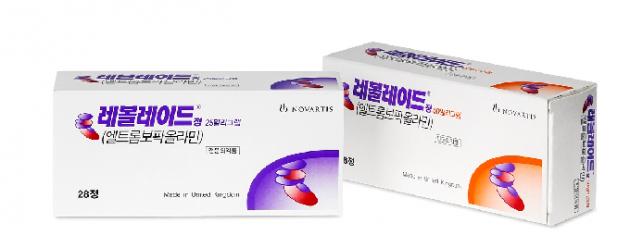Novartis Korea said Tuesday additional data analysis from its EXTEND clinical trial for Revolade (ingredient: eltrombopag) proved it safe and effective for those 65 years and older with idiopathic thrombocytopenic purpura (ITP).
The sub-set study findings were presented at the first International Congress of BMT symposium held in Seoul on Aug. 26.

Revolade (known as Promacta in the U.S.) was developed by GlaxoSmithKline (GSK) and transferred to Novartis노바티스 when it acquired the former’s oncology portfolio.
The drug is used to treat idiopathic thrombocytopenic purpura, an autoimmune disease that can result in easy or excessive bruising and bleeding caused by abnormally low levels of platelets, cells that help blood clot.
The Health Insurance Review and Assessment Agency (HIR) said 8,673 Korean patients were treated for the disease in 2016.
The disease affects children and adults differently, with kids often recovering without treatment and adults suffering from the disease for long. The condition leaves seniors more vulnerable to bleeding and comorbid diseases which shorten overall life expectancy.
Study findings showed that for those 60 years or older with a platelet count less than 30,000/μL, the risk of bleeding within a year was tenfold compared to those with the same platelet count in the 40 to 60-year-old age bracket (71 percent vs. 7 percent).
The study results showed that 86 percent (43 out of 50 patients over 65 years old) had reached adequate platelet counts of 50,000/μL – the level required to perform physical activity without additional treatment. The risk of bleeding also decreased from the baseline of 66 percent to four percent, the company added.
“These results indicate Revolade can be an effective treatment option for patients over 65 years old with ITC,” said Raymond Wong who presented the EXTEND clinical trial results at the symposium.
Revolade also showed better overall and long-term platelet counts in elderly patients than younger ones, the company said.
About 74 percent of the over-65 group achieved platelet counts exceeding 50,000/μL, which was 15 percentage points higher than the under-65 group. And 52 percent of senior patients also maintained a higher platelet count for over 22 weeks versus the 46 percent of those under 65.
There was no significant difference in the safety and tolerability between the two groups, the company added.

